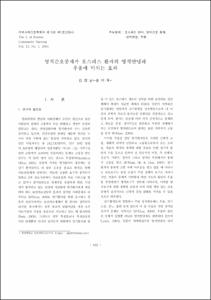영적간호중재가 호스피스 환자의 영적안녕과 우울에 미치는 효과
- Keimyung Author(s)
- Kim, Chong Nam
- Department
- Dept. of Nursing (간호학)
- Journal Title
- 지역사회간호학회지
- Issued Date
- 2004
- Volume
- 15
- Issue
- 1
- Abstract
- Purpose: The purpose of this study was to elucidate the effects of spiritual nursing intervention on the spiritual well-being and depression levels of hospice patients.
Method: The data for this study were collected from 62 patients who were admitted to the hospice care unit from July 28, 2002 to October 31, 2002 in D city K hospital. Subjects were 31 members ofthe experimental group and 31 members of the control group. It was devised with a nonequivalent control group pretest-posttest design. The spiritual nursing intervention was given by using the therapeutic use of self, Scripture, prayer, Hymn and music, use of church community involvement and referrals to pastors according to the assessment of patients’ spiritual needs for 3 weeks(total 12 times and 1hour per each intervention). Sangsoon Choi and Jungho Kang’s spiritual well-being scale, which was modified from Palautzian and Ellison(1982)'s spiritual well-being scale, was used to investigate patients’ spiritual well- being. To investigate the level of depression, OkHyun Song’s Depression Scale, which was modified from Zung’s Depression Inventory, was used. Data were analyzed by χ 2-test, t-test, and repeated measures ANOVA with SPSS/Win 10.0 program. Results: 1. The 1st hypothesis, ‘total spiritual well being score in the experimental group, who received the spiritual nursing intervention, will be higher than the control group who did not receive the spiritual nursing intervention’ was supported (F=6.28, p=0. 015, Interaction: p=0.000). 2. The 1-1st sub-hypothesis, ‘religious well-being score in the experimental group, who received the spiritual nursing intervention, will be higher than the control group who did not receive the spiritual nursing intervention’ was supported(F=12.75, p=0.001, Interaction: p=0.000). 3. The 1-2nd sub-hypothesis, ‘existential well-being score in the experimental group, who received the spiritual nursing intervention, will be higher than the control group who did not receive the spiritual nursing intervention’ was supported(F=6.87, p=0.016, Interaction:
p=0.000). 4. The 2nd hypothesis, ‘depression level in the experimental group, who received the spiritual nursing intervention, will be lower than the control group who did not receive the spiritual nursing intervention’ was supported (F=10.45, p=0.002, Interaction: p=0.000).
Conclusion: From the above results, spiritual nursing intervention was an effective program to improve the spiritual well-being state and decrease the depression levels of the hospice patients. In the future, with spiritual intervention, which the researcher developed, is applied in the nursing field, the hospice patients can have comprehensive well being including spiritual well being and die peacefully.
본 연구의 목적은 영적간호중재가 호스피스환자의 영
적안녕과 우울정도에 미치는 효과를 확인하고자 시도하
였으며 연구설계는 비동등성 대조군 전후설계의 유사실
험연구이며, 자료수집 기간은 2002년 6월 28일부터 10
월 31일 사이에 이루어졌다. 연구대상은 D광역시 K대학
병원 호스피스 병동에 입원한 호스피스 환자이며 실험군
31명, 대조군 31명, 총 62명으로 실험군에게 제공되는
실험처치는 영적요구사정에 따라 자신의 치료적 사용,
성경의 사용, 기도의 사용, 찬송과 음악의 사용, 교회공
동체 활용 및 목회자에게 의뢰하는 내용 등으로 영적간
호 중재가 구성되었다. 각 대상자에게 매회 1시간, 매주
4회씩 3주동안 총 12회를 제공하였다.
연구도구는 영적안녕을 측정하기 위해 Palautzian,
Ellison에 의해 개발한 것을 바탕으로 Choi(1990)이
번역하고, Gang(1996)가 수정보완한 것을 사용하였
다. 우울 측정도구는 Zung(1965)이 개발하고 Soung(1977)
이 번역한 것을 사용하였다.
자료분석방법은 SPSS/Win 10.0 프로그램을 이용하
여 χ²test, t-test, Repeated measures ANOVA, 사
후검증으로 단순 주효과 분석을 실시하였다.
연구결과는 다음과 같다
1) 제 1가설
‘영적간호중재를 받은 실험군은 영적간호중재를 받지
않은 대조군보다 영적안녕 정도가 더 높아질 것이다.’는
지지되었다(F=6.28, p=0.015, Interaction; 0.000).
(1) 부가설 1-1
‘영적간호중재를 받은 실험군은 영적간호중재를 받지
않은 대조군보다 종교적안녕 정도가 더 높을 것이다.’는
지지되었다(F=12.75, p=0.001, Interaction: 0.000).
(2) 부가설 1-2
‘영적간호중재를 받은 실험군은 영적간호중재를 받지
않은 대조군보다 실존적안녕 정도가 더 높을 것이다.’는
지지되었다(F=6.87, p=0.016, Interaction: 0.000). 2) 제 2가설
‘영적간호중재를 받은 실험군은 영적간호중재를 받지
않은 대조군보다 우울 정도가 더 낮을 것이다'는 지지되
었다.’(F=10.45, p=0.002, Interaction: 0.000).
결론적으로, 호스피스 환자에게 제공된 영적간호중재
는 영적안녕의 향상과 우울을 감소시키는 데 효과적인
것으로 검증되었으므로 임상실무에 적용하여 남은 생을
평안하게 지내고 죽음을 잘 준비하여 생을 마무리하도록
돕는 호스피스 간호에 유용한 간호중재로 활용할 수 있
을 것으로 사료된다.
2. 제 언
1) 연구자가 개발한 영적간호 중재를 실무에 활용할 수
있는 적극적 방안 마련이 요청된다.
2) 기독인이 아닌 다른 종교를 믿는 사람 및 종교가 없
는 호스피스 대상자에게 적용될 수 있는 영적간호중
재 개발이 요청된다.
3) 대상자가 자신이 연구대상이라는 것을 인식하고 있는
것에 기인한 Hawthorne효과를 제거한 연구설계를
마련하여 반복 연구할 것을 제언한다.
- Alternative Title
- Effect of Spiritual Nursing Intervention on Spiritual Well being and Depression of Hospice Patients
- Keimyung Author(s)(Kor)
- 김정남
- Publisher
- College of Nursing
- Citation
- 김정남 and 송미옥. (2004). 영적간호중재가 호스피스 환자의 영적안녕과 우울에 미치는 효과. 지역사회간호학회지, 15(1), 132–144.
- Type
- Article
- ISSN
- 1225-9594
- Appears in Collections:
- 2. College of Nursing (간호대학) > Dept. of Nursing (간호학)
- 파일 목록
-
-
Download
 oak-bbb-05018.pdf
기타 데이터 / 241.4 kB / Adobe PDF
oak-bbb-05018.pdf
기타 데이터 / 241.4 kB / Adobe PDF
-
Items in Repository are protected by copyright, with all rights reserved, unless otherwise indicated.